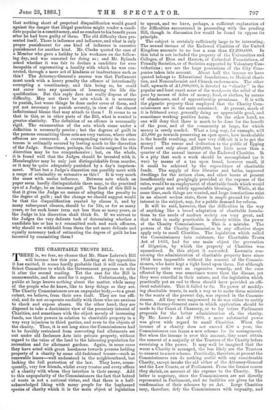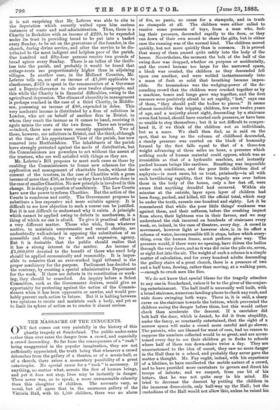THE CHARITABLE TRUSTS BILL.
THERE is, we fear, no chance that Mr. Shaw Lefevre's Bill will become law this year. Looking at the opposition it has excited, it seems hardly probable that it will reach the Select Committee to which the Government proposes to refer it after the second reading. Yet the case for the Bill is unanswerable, and the need for it urgent. Unfortunately, the public at large knows nothing about the matter, while many of the people who do know, like to keep things as they are. The Charity Commissioners are an unpopular body,—to a great extent, we believe, from their own fault. They are too offi- cial, and do not co-operate cordially with those who are anxious to check and expose abuses. On the other hand, they are disposed to take a doctrinaire view of the pecuniary interest of Charities, and sometimes with the object merely of increasing funds, use their powers in relation to charitable property in a way very injurious to third parties, and even to the objects of the charity. Thus, it is not long since the Commissioners had to be forcibly restrained from converting fuel allotments set out under old Inclosure Acts into private property, without regard to the value of the land to the labouring population for recreation and for allotment gardens. Again, in some cases they have acted with great harshness towards persons holding property of a charity by some old-fashioned tenure—such as renewable leases—well understood in the neighbourhood, but lacking the full protection of the law. They have, conse- quently, very few friends, whilst every trustee and every officer of a charity with whom they interfere is their enemy. Add to this unpopularity of the Commissioners the fact that hatred of waste is not a national virtue, and that there is a half- acknowledged liking with many people for the haphazard species of charity which it is the main object of legislation
to uproot, and we have, perhaps, a sufficient explanation of the difficulties encountered in proceeding with the pending Bill, though in discussion few would be found to oppose its principle.
The subject is certainly sufficiently large to be interesting. The annual income of the Endowed Charities of the United Kingdom amounts to no less a sum than £2,200,000. In this total is not included the property of the Universities and Colleges, of Eton and Harrow, of Cathedral Foundations, of Friendly Societies, or of Societies supported by Voluntary Con- tributions ; nor are the huge possessions of the City Com- panies taken into account. About half the income we have quoted belongs to Educational foundations, to Medical chari- ties, and Nonconformist and Church endowments. The other half, upwards of £1,000,000, is devoted to charity " in the popular and least exact sense of the word,—to the relief of the poor by means of doles of money, food, or clothes, by means of almshouses, and of apprenticeship premiums. It is with the gigantic property thus employed that the Charity Com- missioners are in the main concerned. At present, much of it is frittered away, generally doing no appreciable good, and sometimes working positive harm. On the other hand, no one will deny that there is much to be done for the benefit of the poor, and of the community at large, for which money is sorely needed. What a long way, for example, will £5,000 go towards preserving an open space, how incalculable is the benefit resulting, and how very difficult it is to get the. money I The rescue and dedication to the public of Epping Forest cost only about £280,000, but little more than a. quarter of the annual income of the Endowed Charities. It is a pity that such a work should be accomplished (as it was) by means of a tax upon bread, however small, it it could be achieved by the expenditure of charitable funds. The supply of free libraries and baths, improved dwellings for the artisan class, and other boons at present insufficiently and grudgingly provided at the expense of the rates, would be an employment of charitable funds which would confer great and widely appreciable blessings. While, at the same time, such things are wanted, and large benefactions exist in an almost useless state, there is ample ground for public interest in the subject, nay, for a public demand for reform.
It will be said, however, that the difficulties in the way of anything like a broad adaptation of charitable founda- tions to the needs of modern society are very great, and that what is really practicable is already within the power of the Charity Commissioners. This is a mistake. The powers of the Charity Commission in any effective shape apply only to small Charities. The legislation which called the Commissioners into existence, the Charitable Trusts Act of 1853, had for one main object the prevention of litigation, by which the property of Charities was. squandered. In this object it succeeded. Lawsuits con- cerning the administration of charitable property have since 1853 been impossible without the consent of the Commis- sioners, who have kept a tight hand upon them. But although Chancery suits were an expensive remedy, and the cure effected by them was sometimes worse than the disease, yet they were remedial in their nature, and the legislation which practically put an end to them should have provided an effi- cient substitute. This it failed to do. No power of modify- ing charitable trusts, in such a way as to make them minister to the wants of the present day, was reposed in the Commis- sioners. All they were empowered to do was either to certify to the Attorney-General cases in which application should be made to the Court of Chancery, or to lay before Parliament proposals for the better administration of. the charity. By Mr. Lowe's Act of 18G0, a more substantial power was given with regard to small Charities. When the income of a charity does not exceed £50 a year, the Commissioners can frame a new scheme for its management. But when the income is over this amount, they must obtain the consent of a majority of the Trustees of the Charity before exercising a like power. It may well be imagined that the worse a Charity is managed, the less likely are the Trustees to consent to anew scheme. Practically, therefore, at present the Commissioners can do nothing useful with any considerable Charity, except invoke the aid either of the Attorney-General and the Law Courts, or of Parliament. From the former course they shrink, on account of the expense to the Charity. The latter is nugatory, since the Commissioners are not directly represented in Parliament, and no facilities are given for the confirmation of their schemes by an Act. Large Charities may, therefore, defy the Commissioners with impunity, and
•
it is not surprising that Mr. Lefevre was able to cite to the deputation which recently waited upon him curious instances of waste and mal-administration. Thus, there is a Charity in Berkshire with an income of £220, to be expended under its trust in providing bread to be put into a basket every Sunday, to be set on the gravestone of the founder, in the church, during divine service, and after the service to be dis- tributed to the most indigent and helpless poor of the parish. One hundred and fifty-four persons receive two pounds of bread apiece every Sunday. There is an influx of the thrift- less into the parish, and probably it would be found that cottage-rents are proportionately higher than in adjoining villages. In another case, in the Midland Counties, Mr. Lefevre tells us, out of an income of £1,300 applicable to almshouses, £575 is spent in the remuneration of a Governor and a Deputy-Governor to rule over twelve almspeople, and this while the Charity is in financial difficulties, owing to the agricultural depression. The climax of absurdity in management is perhaps reached in the case of a third Charity, in Middle- sex, possessing an income of £80, expended in doles. This very moderate income is distributed by a firm of solicitors in London, who act on behalf of another firm in Bristol, to whom they remit the income as it comes to hand, receiving it again minus the costs of the two firms. There are trustees, —indeed, three new ones were recently appointed. Two of these, however, are solicitors in Bristol, and the third, although at the time of his appointment Vicar of the parish, has now removed into Hertfordshire. The inhabitants of the parish have strongly protested against the mode of distribution, but the Commissioners are powerless to act without the assent of the trustees, who are well satisfied with things as they are.
Mr. Lefevre's Bill proposes to meet such cases as these by enabling the Commissioners to frame new schemes for the application and management of charitable funds, without the consent of the trustees, in the case of Charities with a gross income of more than £50, as freely as they have hitherto done in the case of smaller Charities. No new principle is involved in this change. It is simply a question of machinery. The Law Courts have now the power to reform Charities. But the action of the Courts is cumbrous and costly. The Government proposes to substitute a less expensive and more suitable agency. It is difficult to see how objection to such a course can be justified. But it is not difficult to understand why it exists. A principle which cannot be applied owing to defects in mechanism, is a thing of which no ()lie is afraid. To give it practical effect is a very different matter. Those who wish, from whatever motive, to maintain unsystematic and casual charity, are undoubtedly well-advised in opposing the substitution of an accessible and cheap, for a slow and expensive, agency. But it is desirable that the public should realise that it has a strong interest in the matter. An income of £1,000,000 devoted to the benefit of those who need help should be applied economically and reasonably. It is impos- sible to conceive that an over-worked legal tribunal is the proper machinery for the purpose. Parliament has decided to the contrary, by creating a special administrative Department for the work. If there are defects in its constitution or work- ing, they should be remedied. An inquiry before a Select Committee, such as the Government desires, would give an opportunity for protesting against the action of the Commis- sioners when it has been oppressive or unwise; and would pro- bably prevent such action in future. But it is halting between two opinions to create and maintain such a body, and yet so to limit its sphere of action as to render it almost useless.



































 Previous page
Previous page